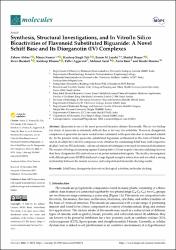Synthesis, Structural Investigations, and In Vitro/In Silico Bioactivities of Flavonoid Substituted Biguanide: A Novel Schiff Base and Its Diorganotin (IV) Complexes

Göster/
Tarih
2022Yazar
Abbas, ZahoorKumar, Manoj
Tuli, Hardeep Singh
M Janahi, Essam
Haque, Shafiul
Harakeh, Steve
Varol, Mehmet
Üst veri
Tüm öğe kaydını gösterKünye
Abbas, Z.; Kumar, M.; Tuli, H.S.; Janahi, E.M.; Haque, S.; Harakeh, S.; Dhama, K.; Aggarwal, P.; Varol, M.; Rani, A.; et al. Synthesis, Structural Investigations, and In Vitro/In Silico Bioactivities of Flavonoid Substituted Biguanide: A Novel Schiff Base and Its Diorganotin (IV) Complexes. Molecules 2022, 27,8874. https://doi.org/10.3390/molecules27248874Özet
Quercetin is one of the most powerful bioactive dietary flavonoids. The in vivo biological study of quercetin is extremely difficult due to its very low solubility. However, diorganotin complexes of quercetin are more useful when contrasted with quercetin due to increased solubility. In the present study, quercetin, substituted biguanide synthesized in the form of Schiff base and its di-alkyl/aryl tin (IV) complexes were obtained by condensing Schiff base with respective di-alkyl/aryl tin (IV) dichloride. Advanced analytical techniques were used for structural elucidation. The results of biological screening against Gram-positive/Gram-negative bacteria and fungi showed that these diorganotin (IV) derivatives act as potent antimicrobial agents. The in silico investigation with dihydropteroate (DHPS) disclosed a large ligand-receptor interaction and revealed a strong relationship between the natural exercises and computational molecular docking results.

















